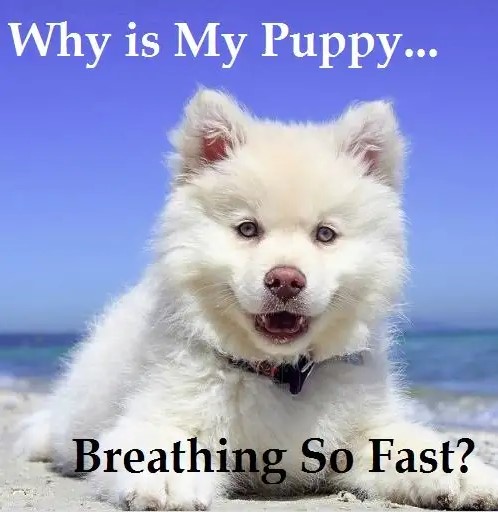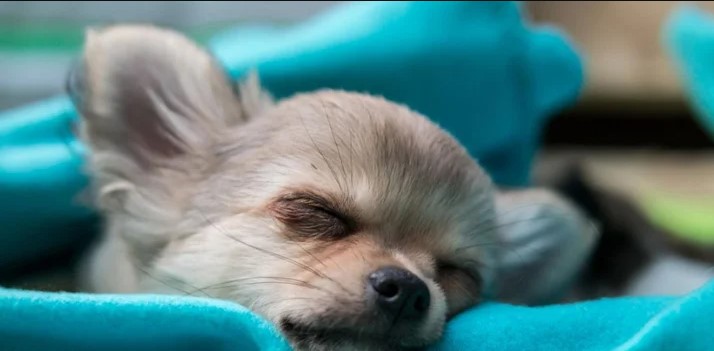Puppy breathing fast while sleeping? Well, puppies are known for sleeping most of the time. They sleep so that they can spend their energy playing with you or doing some minor activities that will need more effort than usual.
However, there are some reasons why your puppy might be breathing fast while sleeping. This is normal in some cases but can also mean something serious.
The following are the reasons why your puppy breathing fast while sleeping:
1) He’s still a baby — Puppies are born without teeth but with their eyes open. They can walk between 1 week to 3 weeks, and they can eat solid food around 3 to 4 weeks. By this time, usually the mother dog will wean their puppies and start training them. They’re not full-grown until they reach the age of eight months or more, depending on their breed.
2) Stress — Stress is a common cause of fast breathing in dogs. Some people think that stress can affect humans but not animals, but it’s the reverse. Dogs feel stressed, too, and they might start panting when stressed out. This is very normal because their bodies need to adjust to changes in climate or environment.
3) Overheating — A symptom of overheating includes heavy panting, wherein your dog pants like crazy while seeking shade under the sun or your fan. Your dog might also suffer from heatstroke if he continues to do this, so you have to check on him every once in a while.
Read here: 10 Reasons Why Your Dog is Constantly Sneezing
4) Anesthesia — If your dog had anesthesia before, then this might be the reason why he’s breathing fast. This is normal, too, because, during the time of the anesthesia, your dog’s body reacted to some changes that caused his breathing to quicken.
5) Allergies — There are several types of allergies in dogs, but one of them includes food allergies. Dogs who are allergic will start scratching their coat until they get inflamed and can cause itching even if they’re not exposed to any insect or worm at all! Other symptoms include swelling around the face or feet area.
6) Heartworms — Heartworms and Lyme disease and very common in some breeds. However, if your puppy is exposed to these worms, then he will start having breathing problems such as panting, and it can get worse over time.
7) Nasal or Throat Irritation — Irritation on either the nasal passages or throat of your dog can cause him to breathe harder than usual. Any infection in his respiratory system might also affect his lungs and make him short of breath easily.
8) Coughs — Coughs are one of the most common conditions found in dogs today, especially during cold seasons when major flu and virus spread like crazy! When a dog coughs, they usually do it for a few seconds only, but if they keep doing it for a longer time, then the irritation might cause the dog to breathe fast.
9) Lung or Heart Problems — There are certain medical conditions, especially on the heart and lungs of your puppy, that can make him breathe harder than usual. One of these is congestive heart failure, which causes fluid build-up around the heart, making it difficult for them to pump blood throughout their body. This makes it hard for them to breathe as well!
10) Seizures — If your dog had a seizure before, then this might be one of the reasons why he’s breathing heavily while sleeping.
As you can see, there are different reasons why your puppy isn’t breathing normally. The above-mentioned facts will help you learn more about your puppy and what might be the possible reason why he’s breathing fast now and then. So if you notice this condition in your pet, then definitely contact your vet for a quick checkup and proper diagnosis. This way, they can determine the real problem and find an immediate solution to it. Another reason for breathing fast can be dog pee issue.
Do dogs sleep differently than humans?

Yes, of course! Different species have evolved in different ways – and sleep is one of the most interesting and varied characteristics.
However, we do know that there are many similarities to humans when we look at the way that dogs sleep. Dogs spend a lot of time sleeping – between 12 and 14 hours a day, depending on the breed, age, and other factors.
There are a number of different stages that a dog will go through to achieve this deep level of sleep.
In the first stage, the body starts to shut down. The dog will start to relax, but the ears and eyes remain alert so that they can wake up quickly if necessary. This phase is short and can last for around five minutes. You may start to notice some twitching in the paws, lip licking, yawning, or whining at this point.
After this initial stage, your dog will enter slow-wave sleep. This is the stage where the breathing slows down significantly – but it doesn’t stop completely like in humans. The heart rate also drops, and the blood pressure will be lower than usual.
Read: Why Your Dog Keeps Licking Their Base Of Tail
As the dog enters deeper sleep, the muscles relax, and breathing slows down even more. At this point, we’ll often start to notice some really light snoring! Finally, when the dog is in a state of very deep sleep (or “delta sleep”), the breathing is very slow and shallow. This is when it’s hardest to see your dog breathing because it happens so slowly.
If you’ve ever watched a sleeping dog, you may have seen that they move their paws around in this state. Some people believe that this movement indicates dreaming, but there’s no evidence for this at all!
Is it normal for dogs to breathe fast while sleeping? — Dog breathing fast while sleeping
Yes, it is very normal for your dog to breathe fast while they are asleep. If you think that your dog breathes abnormally during his or her sleep, then you should consult a vet. Breathing fast will usually only happen if your pup is too excited before bedtime or not getting enough sleep. Dogs have a rapid breathing rate when they are excited or anxious, but their usual breathing rate is anywhere from 30 to 40 breaths per minute. Their breathing slows down during the night while they sleep. Any change in your dog’s breathing pattern is worth checking out with a vet.
How fast do puppies breathe? How many breaths should a dog take per minute?
An adult dog’s normal resting breathing rate is 10-30, while a puppy’s is 15-40. Puppies breathe faster than full-grown dogs. A young puppy’s breathing rate is about 40 breaths per minute, but that number will decrease as the dog matures.
How can my dog be breathing fast and acting normal at the same time?
A dog’s fast breathing, regardless of breed, could mean that your pet is suffering from an injury or illness and needs urgent veterinary treatment. The following are a few possible causes of fast or heavy breathing in dogs: Asthma and Lung Diseases such as cancer.
Conclusion
Puppies are just like babies in that they need a lot of sleep. They also experience stress, overheating, and other problems that can make them breathe fast during sleep. If your dog breathes heavily when sleeping, it’s important to take him to the vet for an evaluation.
Puppies are adorable, but they can also be a little mysterious. We hope that this article has helped to clear up some of the questions you may have about your puppy’s health. If you have any further concerns, please contact your veterinarian. Thanks for reading!

